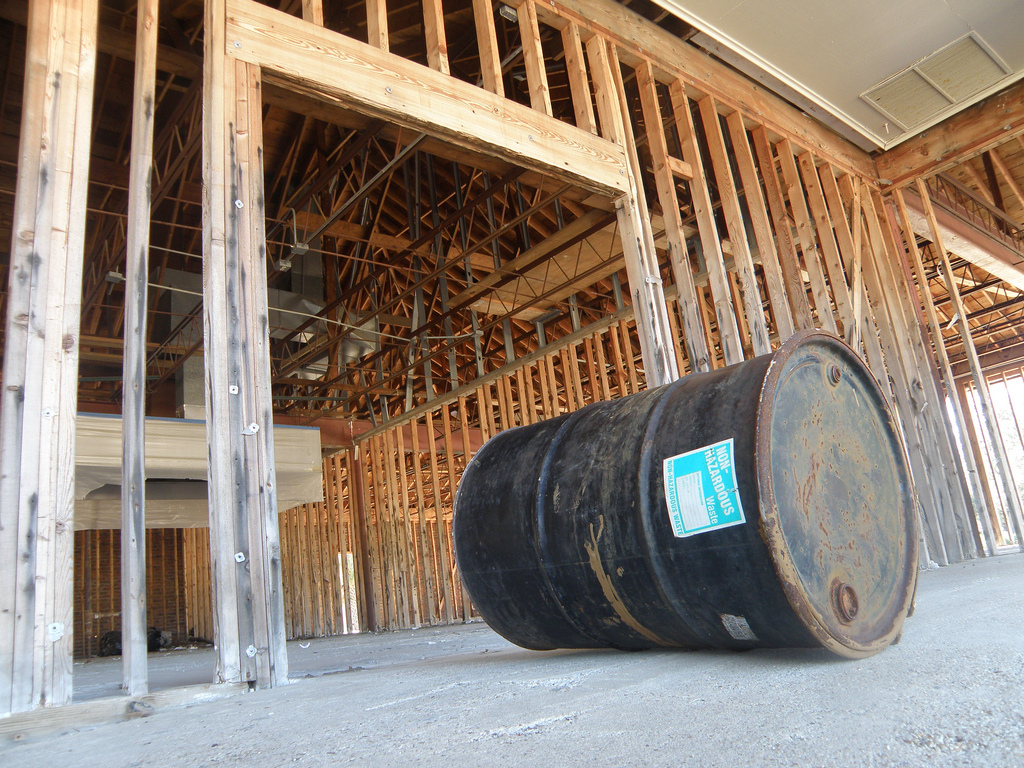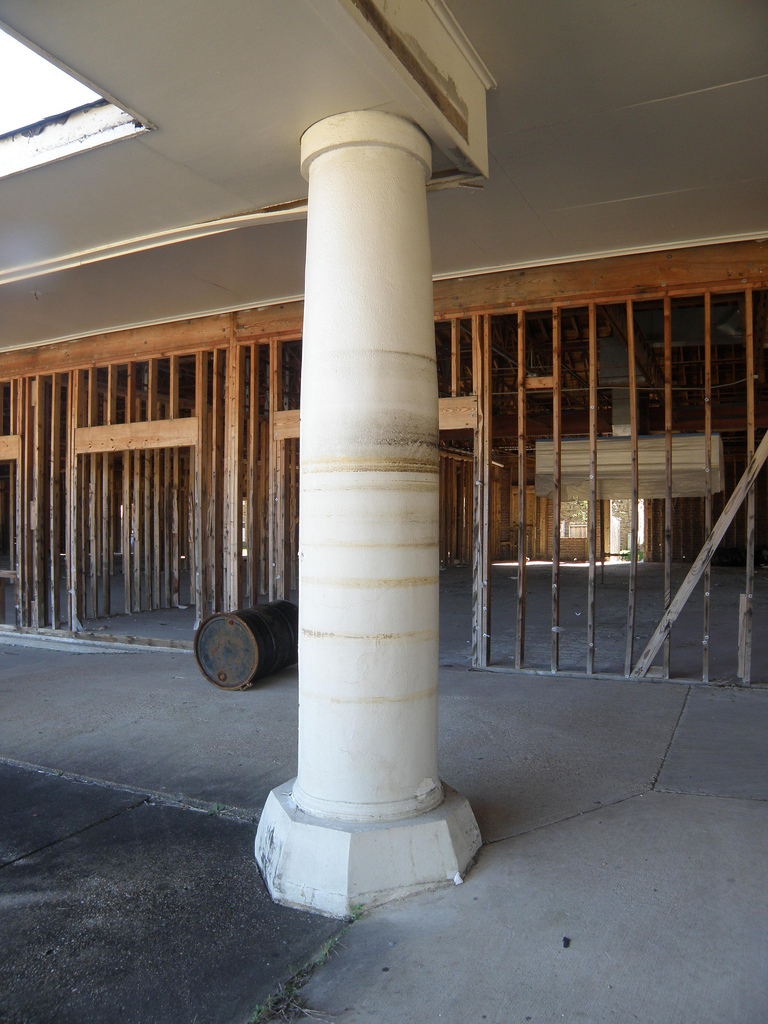A taxpayer-financed program to stimulate economic development in New Orleans continues to back dubious business ventures, throwing into question the city’s stewardship of some $2.5 million in annual grants, an investigation by The Lens and Fox 8 News has found.
Since December 2008, more than $200,000 has been funneled to the owners of a sorely needed Gentilly shopping center and a Carrollton restaurant. But more than a year after the grant recipients were chosen, the abandoned shopping center stands open to the elements and the restaurant has gone belly up.
The business address used to apply for the shopping-center grant never existed, and the restaurant owner got his last check from the city after his place was shuttered.
Required status updates from both grant recipients were submitted, but gave no indication of problems. In fact, one thin report from the shopping center developer shook loose another round of money from what’s called the Economic Development Fund Grant Program.
The moribund strip mall and the failed restaurant are prime examples of how an ailing and long-criticized program still falls short of its original intent – to bring about real, quantifiable business activity. The $2.5 million in grants are drawn directly from taxes paid by city property owners.
“I think it has worked very poorly, quite candidly,” said New Orleans City Council President Arnie Fielkow, who also leads the council’s economic-development committee. The program is “definitely falling short. That’s not to say that some of the awardees over the years have not used the money wisely.”
The program, begun in 1991 with voter approval, drew a bit of infamous attention in 2006 when the New Orleans City Council approved a $350,000 handout to an eastern New Orleans couple to make and market a personal portable toilet. To date, there’s still been no accounting for that money. And no toilet company, either.
The original ballot initiative called for the money to be used for “economic development.” That’s not terribly specific, and the city has struggled with how best to use the money.
Initially, only non-profits were eligible for the grants. Then businesses became eligible. And in recent years, the city has tapped the fund for a variety of its own governmental uses.
For instance, the City Council this month took $1.1 million from the fund to balance the city budget. It also used $2.3 million this year and last to pay for enhanced cleaning of the French Quarter streets and sidewalks.
But for nearly two decades, the money was primarily used to help non-profits and small businesses, and it operated with little public scrutiny or attention. Or for that matter, with little public awareness.
“There have been problems even in how the (selection) committee and the mayor have communicated this program to the public,” Fielkow said.
The tax generates about $2.5 million a year, and the city advertises for applicants. An advisory committee appointed by the mayor reviews the applications and makes recommendations to the mayor. In turn, he passes his selection to the City Council, which has the final authority to make or refuse each grant. A city official is then charged with distributing, monitoring and administering the money.
A reform-minded City Council changed the rules before the 2007 grants were given out in late 2008. After the toilet debacle, the council required a cost-benefit analysis of each project on the front end, and more detailed reporting about the grants as the projects progressed.
Slowed by poor attendance at the advisory committee meetings, the grant-making process was running 10 months behind schedule when things boiled over at a December 2008 council meeting.
Frustrated applicants railed at the council members. At one point, a small-business entrepreneur named Michael Dummett was escorted from chambers after a fiery outburst demanding his grant.
In all, the council gave 22 grants worth $2.2 million.
Dummett got a $40,000 grant to help finance Big Shirley’s, a soul-food restaurant on South Carrollton Avenue, named for his mother.
His first installment of $30,000 was sent on Feb. 2, 2009, about a month after he opened. An undated report of his progress said that he had fully renovated and equipped the eatery, that he had created eight jobs and that he was bringing in $45,000 a month. No other progress reports were included in the city’s file, which was obtained through a public-records request.
He got another city check in May for $6,000. The last check, for $4,000 was issued Aug. 5 – after Dummett had served his last meal, just seven months after opening. By Aug. 1, the windows were papered over, leaving only a for-lease banner visible.
In an interview, Dummett said he was still in business, in a manner of speaking. True, he’d closed down on Carrollton, but he had opened a kitchen inside of a bar in Faubourg Marigny. That venture, too, has since ended.
“My intention was not to take something that wasn’t mine,” he said about the last city check.
He said he used the city grant money to repay people who kept him afloat while he waited for the grant.
In short, he said the lengthy grant delay doomed his restaurant. If he received the money early on, he reasoned, he would have been better positioned to ride out the recession.
Thomas Nash, who oversees the grant program for the city’s Office of Community Development, admitted that he should have been more diligent in this case.
“The city was not aware whatsoever that the business was out of operation,” Nash said in an interview. “Had it been, I would have immediately stopped the check.”
With his $40,000 grant, Dummett was a relative small fry. At the other end of the scale is Kenneth Charity, head of DKM Acquisitions, who won an award for $250,000, the highest amount handed out.
He’s the would-be shopping center developer who has done little visible work for the $162,500 that the city has shelled out to revive the strip mall at the corner of Paris Avenue and Robert E. Lee Boulevard. Stains still show the high-water mark from Katrina flooding, the inside smells of human waste and skateboarders have set up ramps and left spray-painted tags.
In a neighborhood hungry for a retail revival, the gutted, wall-less building is a source of frustration – only more so since residents’ tax dollars have gone to the developer. The community had put a high priority on rehabbing the property during the Unified New Orleans Plan process.
Charity would not speak on the record for this story. Nash defended him, however, saying that Charity has spent the city award, plus much more, on “soft costs” associated with the project. Those include architect fees and permits from the city.
Nash said the project is hung up because the city hasn’t moved quickly enough to issue the necessary permits. However, the progress report in Charity’s file makes no note of that.
In fact, it lists “plans/permits” under “significant developments.”
Charity, doing business as DMK Acquisitions, purchased the Lake Terrace Center in April 2007 for $1.3 million.
That September, he applied for a grant from the economic development pot. His application lists 64 Newcomb Blvd. as his office. In fact, the address is that of Newcomb College, and the suite number Charity used on his application doesn’t exist. Calls to Tulane University revealed that Charity has never been an employee of the school.
According to his application, Charity needed the money to “renovate, reface, structuralize and put back into commerce” the shopping mall. Details were lacking in the original application as to what the funds would be used for.
Like most recipients, his grant was well below his request of $1 million, coming in at $250,000. That’s a relatively small amount for a project that Charity’s application said would total $3 million.
His grant was also a pittance compared to the other acquisitions that DKM made about the same time. Charity’s company paid more than $4 million for other properties that included a condo in Jax Brewery, the old Vasquez Seafood market and a duplex in the Carrollton neighborhood.
The Vasquez site is unguttted and open to the elements. Neighbors near the Carrollton address say they’ve seen no activity for months.
Council President Fielkow said he doesn’t think the economic development money should be used for a project that the applicant is able to finance.
“This is really not designed to help a wealthy millionaire have added dollars to open a particular development,” Fielkow said. Acknowledging that his view isn’t universally shared among council members, he added that he would prefer making awards only in cases where the award makes the critical difference in moving a project forward.
Charity didn’t just benefit from a city grant. To help identify the types of business that the neighborhood wanted and would support, the Greater New Orleans Foundation awarded $60,000 to the Regional Planning Commission to finance such a study for Gentilly.
The group turned over the study to Charity, giving him the equivalent of a treasure map that pointed him to the kinds of opportunities that would likely thrive and draw business.
In June of 2009 Charity received his first payment of $100,000 to begin work on the project. Charity was issued another check in September for $62,500. That was based on his report that “currently set objectives are targeted to meet projected funding periods… project will meet time period, possibly will complete before our projected scheduled period.”
Fielkow was incredulous when told of the chain of events.
“There should never have been a second check issued by the administration unless there was verification that the first monies were being used in the ways in which they were granted,” he said.
Nash said he makes site visits, but the city makes no attempt to verify the progress cited in the reports sent in by recipients of grant money.
Charity’s initial application said the project would be finished six months after getting his city grant.
That would have been before Christmas.
Reporter Jennifer Hale of Fox 8 News contributed to this report. Watch her report on Fox 8:



